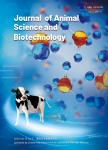Dietary protocatechuic acid ameliorates inflammation and up-regulates intestinal tight junction proteins by modulating gut microbiota in LPS-challenged piglets
Dietary protocatechuic acid ameliorates inflammation and up-regulates intestinal tight junction proteins by modulating gut microbiota in LPS-challenged piglets作者机构:Hunan Collaborative Innovation Center for Utilization of Botanical Functional IngredientsCollege of Animal Science and TechnologyHunan Agricultural UniversityChangsha 410128China Department of Food Science and BiotechnologyFaculty of AgricultureKagoshima UniversityKagoshima 890-0065Japan Beijing China-Agri HongKe Bio-Technology Co.Ltd.Beijing 102206China State Key Laboratory of Animal NutritionInstitute of Animal SciencesChinese Academy of Agricultural SciencesBeijing 100193China.
出 版 物:《Journal of Animal Science and Biotechnology》 (畜牧与生物技术杂志(英文版))
年 卷 期:2021年第12卷第1期
页 面:328-339页
核心收录:
学科分类:0710[理学-生物学] 0831[工学-生物医学工程(可授工学、理学、医学学位)] 090603[农学-临床兽医学] 0832[工学-食品科学与工程(可授工学、农学学位)] 1004[医学-公共卫生与预防医学(可授医学、理学学位)] 0905[农学-畜牧学] 0906[农学-兽医学] 09[农学] 0703[理学-化学] 0836[工学-生物工程]
基 金:partially supported by the funds from the National Natural Science Foundation of China (31772819, 31741115) Hunan Provincial Natural Science Foundation for Distinguished Young Scholars (2019JJ30012) Double-First-Class Construction Project of Hunan Province (kxk201801004)
主 题:Gut microbiota Inflammation Piglets Protocatechuic acid Tight junction proteins
摘 要:Background: Weaning is one of the major factors that cause stress and intestinal disease in piglets. Protocatechuic acid(PCA) is an active plant phenolic acid which exists in Chinese herb, Duzhong(Eucommia ulmoides Oliver), and is also considered as the main bioactive metabolite of polyphenol against oxidative stress and inflammation. This study aimed to investigate the effect of PCA on growth performance, intestinal barrier function, and gut microbiota in a weaned piglet model challenged with lipopolysaccharide(LPS).Methods: Thirty-six piglets(Pig Improvement Company line 337 × C48, 28 d of age, 8.87 kg ± 0.11 kg BW) were randomly allocated into 3 treatments and fed with a basal diet(CTL), a diet added 50 mg/kg of aureomycin(AUR), or a diet supplemented with 4000 mg/kg of PCA, respectively. The piglets were challenged with LPS(10 μg/kg BW) on d 14 and d 21 by intraperitoneal injection during the 21-d experiment. Animals(n = 6 from each group) were sacrificed after being anesthetized by sodium pentobarbital at 2 h after the last injection of LPS. The serum was collected for antioxidant indices and inflammatory cytokines analysis, the ileum was harvested for detecting mRNA and protein levels of tight junction proteins by PCR and immunohistochemical staining, and the cecum chyme was collected for intestinal flora analysis using 16 S rRNA gene ***: Dietary supplementation of PCA or AUR significantly increased the expression of tight junction proteins including ZO-1 and claudin-1 in intestinal mucosa, and decreased the serum levels of thiobarbituric acid reactive substances(TBARS) and IL-6, as compared with CTL group. In addition, PCA also decreased the serum levels of IL-2 and TNF-α(P 0.05). Analysis of gut microbiota indicated that PCA increased the Firmicutes/Bacteroidetes ratio(P 0.05). Spearman s correlation analysis at the genus level revealed that PCA reduced the relative abundance of Prevotella 9, Prevotella 2, Holdemanella, and Ruminococcus t



